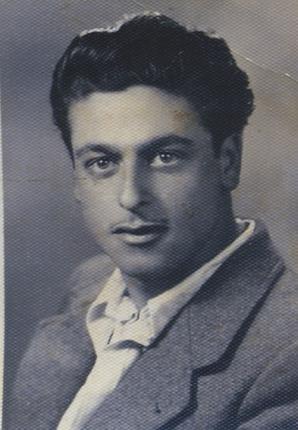How Nicolo Pau Found the Love of His Life Instead of the Ducati his Dreams in Munich
Nicolo Pau was born on September 10, 1931 in Oliena on Sardinia. He supported his family with the meager income he was able to earn working in agriculture. As a young man, he dreamt of buying a Ducati. Nicolo decided to go to Germany for a while in order to be able to make the money for this dream and then return home. He passed the mandatory physical exam at the German Employment Agency’s office in Verona in early 1960. He signed a six-month employment contract at the construction company Leonhard Moll in Munich – he had no idea, though, that he would work there for the next twenty-two years.
Nicolo Pau left his home on March 19, 1960 and arrived in Munich by train three days later. His first impression was a shock: Since it had been springlike and warm on Sardinia, Nicolo arrived coatless and only had shoes on. It was snowing in Munich, though, and it was freezing cold. He was given a croissant and a cup of coffee – not much more than warm brown water to him – as a welcome in the bunker underneath platform 11. A Moll representative came to the train station that very same day and picked up Nicolo and the other “guest workers” assigned to it with a truck. Following their registration, which the company took care of just like their work permits and residence permits, everyone was given an advance of DM 30. The men had the first day off so that they could move into their lodgings, five to a room. Rent was DM 1 a day.
Nicolo’s first day of work was March 23, 1960. He was first put to work as a laborer in the metalworking shop and later as a machine operator in the crushing plant. The hourly wage was DM 2.11. Nicolo Pau earned DM 70 a week, sometimes even DM 80 with overtime. He received his pay in cash every Friday. It was recorded on payslips, which Nicolo kept. Nicolo’s first employment contract ran just six months. Since his employer was happy with his work, his contract was renewed and then made permanent, his hourly wage being ten pfennigs more then.
This had boosted his prospects for the Ducati once again. Nicolo originally intended to remain in Germany just two years. But then the love of his life intervened. He met Elisabeth in 1961. He had planned a vacation at home with his family and was looking for a gift at a jewelry store on Munich’s Stachus. His great fortune was a sales clerk that spoke Italian. It was Elisabeth. Nicolo was happy to be able to communicate with somebody in his native language and invited Elisabeth and her mother to coffee. The young people fell in love with each other but it took a while before Elisabeth’s mother accepted their relationship. They married in 1962.
Since he felt it unjust that German workers earned fifteen pfennigs more for the same work because of their better training, Nicolo decided to complete a three-year machinist training program. Moll paid for this completely and purchased the necessary fine tools, which Nicolo still cherishes. Classes were held at the evening school from 6 to 10 p.m. Since his German was poor, he copied everything from the board nice and neatly and had his wife explain the meaning at home. The greatest challenge for him, however, was the lack of time for family life. Since Nicolo was away from home virtually around the clock, his children hardly knew their father at all. And Elisabeth had to listen to spiteful remarks from neighbors such as “Now he’s left you.” Elisabeth and Nicolo recall that older people in particular were often unfriendly toward them – many were prejudiced against “guest workers” and foreigners.
Elisabeth and Nicolo had initially intended to move to Italy after marrying, since Nicolo was extremely homesick. Once their children had been born in Germany, though, they decided to stay in Munich where they saw better opportunities for their children’s development. The Paus nevertheless feel strongly attached to Italy: They vacation at Nicolo’s parents’ house on Sardinia every year. And the two children consider themselves genuine Europeans. The Paus have loaned Nicolo’s payslips to the Museum of Bavarian History.
Sources/Literature: Eyewitness interview by the Haus der Bayerischen Geschichte


